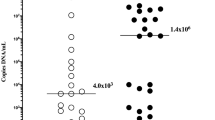Abstract
Different microorganisms not commonly found in the female genital tract have been implicated as causative agents for amniotic fluid infections. Eikenella corrodens is part of the normal flora in the human oral cavity and upper respiratory tract. It is most commonly found in the clinical setting of polymicrobial infections involving human bite wounds, head and neck infections, and periodontitis. On rare occasions, E. corrodens has been reported as a cause of gynecologic infections. There are only 3 reports of documented E. corrodens chorioamnionitis of the placenta resulting in preterm labor, one of which is associated with early neonatal demise. We report a case of preterm delivery of twin infants at 23 weeks of gestation with documented E. corrodens infection in 1 twin who was not resuscitated.

Similar content being viewed by others
References
Tsvetkov K, Kozovski G, Tsvetkov Ts, Petkova U. Eikenella corrodens in the etiology of tubo-ovarian abscesses in patients with intrauterine devices. Akush Ginekol (Sofia) 2003;42(suppl 1):4–7
Ahmad MM. IUDs, actinomyces. IPPF Med Bull 1987;21:3–4
Bosch J, Ros R. Tubo-ovarian abscess caused by Eikenella corrodens. Enferm Infec Microbiol Clin 1991;9:659–960
Riche O, Vernet V, Megier P. Bartholin’s abscess associated with Eikenella corrodens. Lancet 1987;2:1089
Andres MT, Martin MC, Fierro JF, Mendez FJ. Chorioamnionitis, neonatal septicaemia caused by Eikenella corrodens. J Infect 2002;44:133–134
Jeppson KG, Reimer LG. Eikenella corrodens chorioamnionitis. Obstet Gynecol 1991;78:503–505
Sporken JM, Muytjens HL, Vemer HM. Intra-uterine infection due to Eikenella corrodens. Acta Obstet Gynecol Scand 1985;64:683–684
Weible DR, Randall HW Jr. Evaluation of amniotic fluid in preterm labor with intact membranes. J Reprod Med 1985;30:777–780
Forbes BA. Bailey & Scott’s Diagnostic Microbiology, 11th ed. St. Louis: Mosby, 2002;443–445
Murray PR. Medical Microbiology, 4th ed. St. Louis: Mosby, 2002;330
Offenbacher S, Katz V, Fertik G, Collins J, Boyd D, Maynor G, McKaig R, Beck J. Periodontal infection as a possible risk factor for preterm low birth weight. J Periodontol 1996;67:1103–1113
Han YW, Redline RW, Li M, Yin L, Hill GB, McCormick TS. Fusobacterium nucleatum induces premature, term stillbirths in pregnant mice: implication of oral bacteria in preterm birth. Infect Immun 2004;72:2272–2279
Hill GB. Preterm birth: associations with genital, possibly oral microflora. Ann Periodontol 1998;3:222–232
Alanen A, Laurikainen E. Second-trimester abortion caused by Capnocytophaga sputigena: case report. Am J Perinatol 1999;16:181
Gherman RB, Browning J, Tramont J, Eggleston MK Streptococcus viridans intraamniotic infection associated with antecedent cunnilingus. Aust N Z J Obstet Gynaecol. 1999;39:257–259
Author information
Authors and Affiliations
Corresponding author
Rights and permissions
About this article
Cite this article
Kostadinov, S., Pinar, H. Amniotic Fluid Infection Syndrome and Neonatal Mortality Caused by Eikenella corrodens. Pediatr Dev Pathol 8, 489–492 (2005). https://doi.org/10.1007/s10024-005-0010-2
Received:
Accepted:
Published:
Issue Date:
DOI: https://doi.org/10.1007/s10024-005-0010-2




